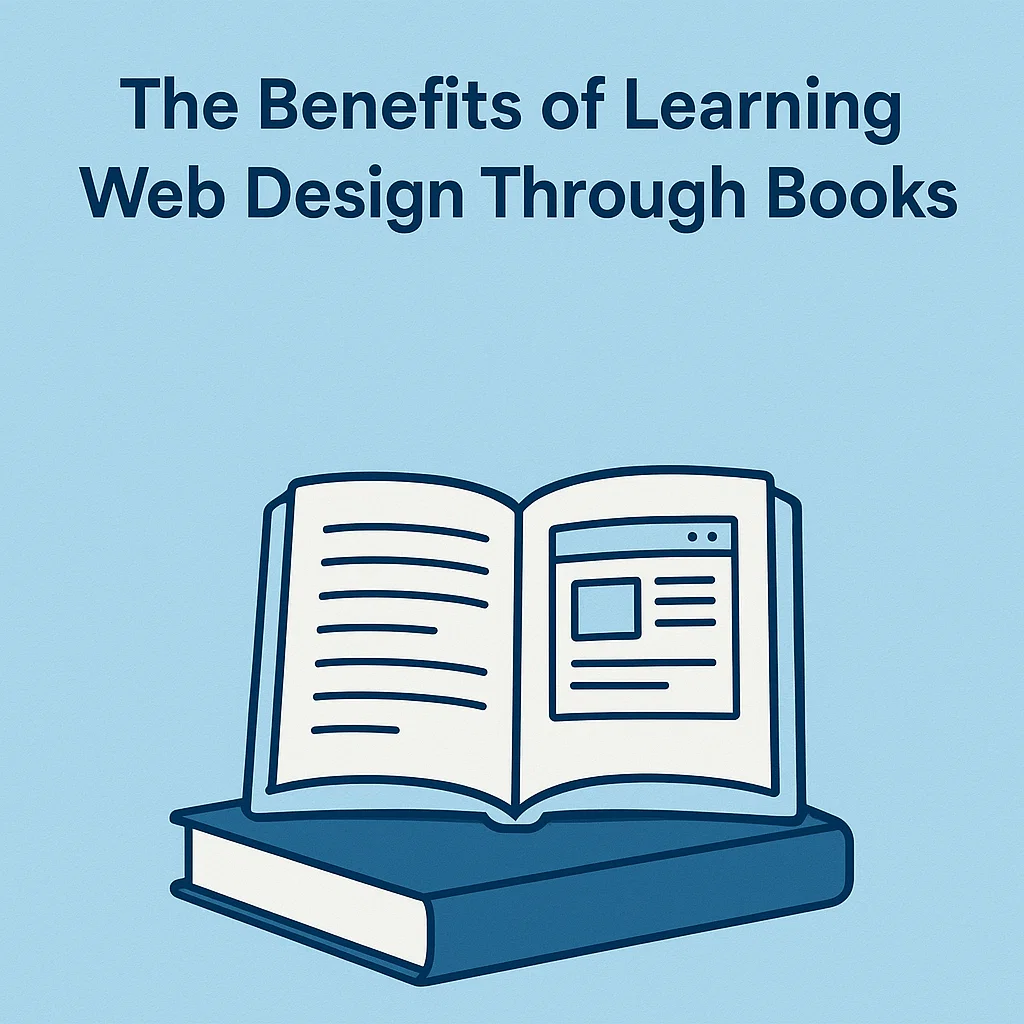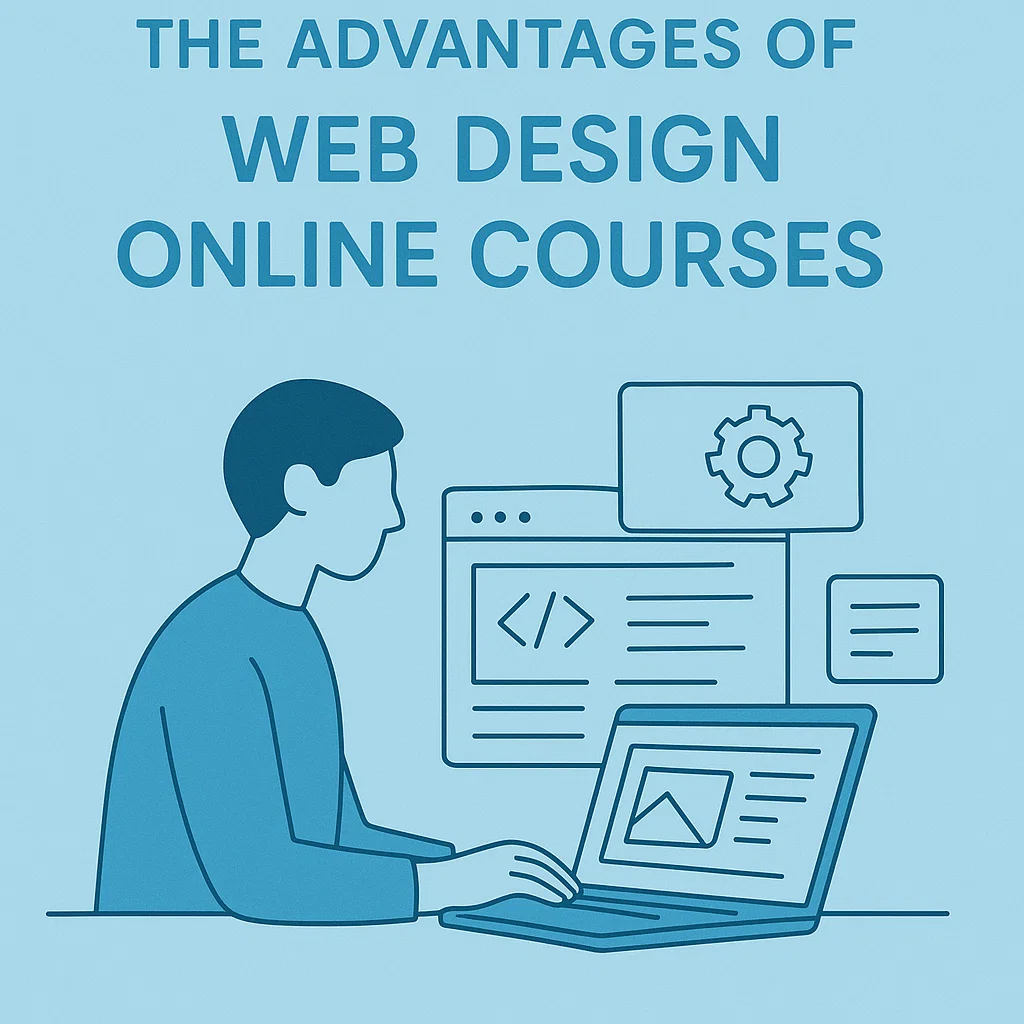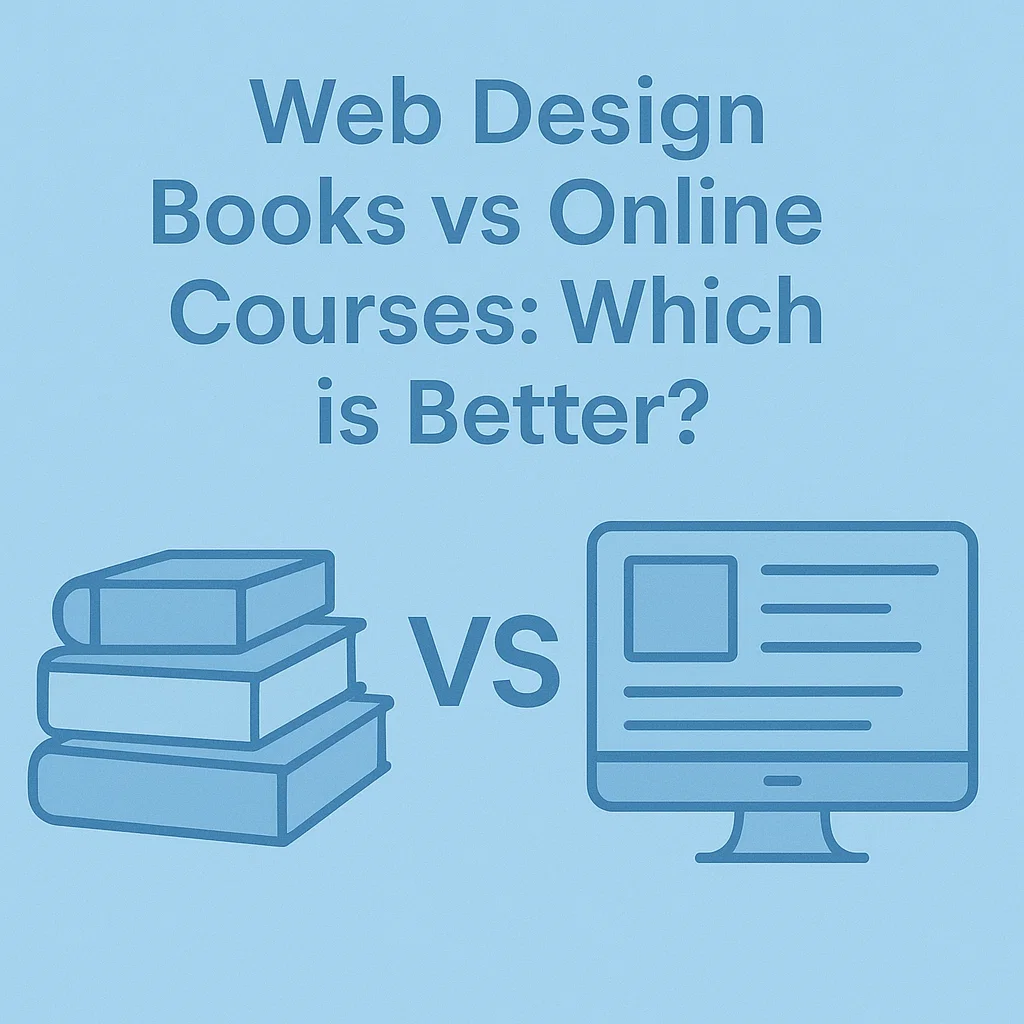Did you think about learning about Web design and web development, and was dicuridged because you dont know where and how to start? Well dont worry today I will explain everything you need to know about 2 most used learning resources for Web design and web development. If you think that you cant have suscess in this field or find a high paying over 6 figure job because you didnt go to colege for this dont worry. 85% of web designers are self-taught through books and online resources?” Learning web design today comes with endless options—from traditional books that provide depth and structure, to dynamic online courses packed with interactive content. But which one should you choose? In this guide, we’ll explore the differences, advantages, and drawbacks of both approaches so you can make the best decision for that fits you and your learning style. I will also talk about my best recomendations as a knowledeble person in both the topics of Learning throw books and through online courses. I personaly experianced both sides of this debate bacause I learned my first programing language which is C# by buying a course and even thou it was a great experiance I learned Web designing and styling throw a book.
3 Benefits of Learning Web Design Through Books

In depth
Unlike Courses books tend to deepen your knowledge on the basics before jumping in to more advanced topics. This aproach prevents holes in your knowledge that usually lead people to quiting learning all together. I know first hand how to learn the wrong way I always rushed throug the basics or skiped them all together because I was so focused on building impresive projects and profitable websites. This aprouch oftern led me to burnout and I never learned anything this way. I always thought that there was something wrong with me or that I wasnt motivated anouph but thankfully maybe that taste of failuire pushed me and teached me how to actually learn productivly.
Writen by trusted profesionals
Evervybody can create a couple hour course on anything and it doesnt take much knowledge, care or effort but not everybody has the resources and the knowledge to write a 300 or 400 page book on a certain topic. To make a course there will very rarerly be any conditions and checks to see if the content you produced is high value, but with a book author needs to go through high industry standards to pass the bar.
No subscription fees + you own the book
The one some people may not find very important but they probably shoudl is that there is no Subscription fees and required wi fi conection. Most course platform has some kind of fees or monthly subscription plans and on top of that they have ads on their websites which will even further distract you from your work. Unlike with Courses when you buy the book you own it it is yours you can sell it, give it to somebody else when you used it or anything you want.
Quick Answers
- In depth learning strategy
- Writen by trusted profesionals
- Authors have to get their books checked by high authority publishers
- No subscription fees
- You own the book
- No wifi connection needed
The Advantages of Web Design Online Courses

A lot of courses and platforms
Online video courses have as many if not even more adventages to you as a new learner compared to books. There is an incredible amount of them on many platforms, from free platforms like Youtube and paid ones like Udemy. If you didnt already know online course platforms are usually created in two ways ones like Udemy give you the ability to buy one course for certein amout of money that the course maker chooses after your purches you will own the course forever and you will have the ability to watch all the updates of the course. Than there is the other type like SkillShare these platforms have a monthly subscription plan and while you have an active subscription you can watch any videos and consume any content. There are huge pros and cons of both and it is very important to evaluate your choice based on your goals and preferences.
Buy-One-Time (Lifetime Access) Course Platforms
PROS
- Lifetime access – you own the course forever, even if the platform changes pricing later.
- Self-paced learning – no pressure to finish quickly since there’s no subscription clock ticking.
- One-time payment – no ongoing fees.
- Good for long-term reference – can revisit content whenever needed.
- Value for specialized courses – if a single course covers exactly what you need, it’s a strong investment.
CONS
- Higher upfront cost compared to a single month of subscription. usually around two or three the price than the monthly subscription but it can go higher
- Limited variety – you only get access to the course(s) you bought.
- Risk of outdated content – some lifetime courses don’t get updated frequently.
- Harder to experiment – if you buy and later realize it’s not the right course, you’re stuck.
- No money back guarantee or a free trial
Subscription-Based Course Platforms
PROS
- All-you-can-learn access – explore hundreds or thousands of courses.
- Affordable for short-term use – cheap if you want to binge-learn in a few months.
- Variety of topics – great for people who like to explore or aren’t sure what they need yet.
- Regularly updated – subscription platforms tend to refresh and add new courses often.
- Community features – some offer group projects, feedback, and peer discussions.
CONS
- Content disappears if you cancel – you lose access when the subscription ends.
- Ongoing cost – can get expensive over years compared to buying once.
- Pressure to finish fast – some learners feel rushed to maximize value before renewal.
- Overwhelming variety – too many choices can lead to less focus. You might constantly swich courses creating inconsistance
- Quality varies – not all courses are equally good, especially on open platforms.
Bonus projects and exercises
A lot of bonus exercises and projects. You probably ask yourself why do you mention this, books can provide the same thing. Yes but the reason I mention this is because in most courses you cant go to the next chapter if you dont fullfil certain exercises or projects and I think this is increadible because it in a way forces you to do them unlike books where undisciplined and unknowledeble people would skip them and try to learn more advanced things before mastering the ones that come before.
Access to mentors, comunities and discounts
The best course creators will often times create a way that you can contact them and ask questions probably a seperate mail just for the people that bought the course or a discord comunity for people to talk and help each other which would be especially usefull if you are trying to find some friendly people that have similar interests to you. Book authors are extremly busy and to be honest to your they are often times a lot older than course creators and not as focused on you as a buyer and now there is more preasure on course creators because they want to create better content than their competition.
No shiping fees and delay
No matter where you bought the book from and where you live there will probably be exspensive shiping fees and complications or some shiping delay. That is just how phisical product delivery works. Delivery will usualy take 2-3 days if you live in major states in US but it can last more than a week if you live outside of US or outside of a country that Amazon has their factories in. If you are purchusing from a country that is far from those factories the shiping fees can cost more than twice the book.
Quick Answers
- Multiple options if you choose a subscription based platform
- Bonus projects that you must finish
- Connection to the course creator
- A online comunity to find advice and people with similar interests
- Discounts on the future courses from that creator
- Discounts from the platform you are using for the future courses
- No shiping fees and delay
Comparing Costs: Books vs Online Courses
It probably wouldnt be a suprise if I told you that you are going to spand more money on courses than books. That is just the truth most books in this topic go from 10 to 40 USA dollars that is without shiping fees.
In this specific niche of Web Development and Web Design some books that cover a lot of topics can reach to 900 pages. Most Courses on the most popular platfom and in my opinion the best one which is Udemy cost around 20 to 30 dollars when they are on discounts which usually happen on special days like black friday or if you are a first time customer. At the end of the day I would advise you to buy the best resource you can Afford and to spand more time on researching the best quality resource instead of overthinking about other things like prize. I personaly think that most of you reading will be able to afford to spand 20 or 30 dollars on this increadible investment which not only can be a great hobby but a future way to earn money as a freelancer or as a employee.
Even thou Some courses can go up to 200 or 300 bucks but that is still noting compared to the price of some hobbies or skills that will have a smaller potenital to return your investment back.
Hybrid Approach – The Best of Both Worlds
This if used proparly can be one of the best ways to learn anything about the web in my opion. There is so much potential to learn better an faster when combineing learning both from books and online courses if you know how to do it proparly. I will tell you the most important things from somebody who first started like this.
My recommendations for you if chose the Hybrid learning plan would be to be very well rounded with both books and courses because if you heavily start learning only from books you will be less organized when you watch the course that you bought. Also if you are not going to learn litle by litle to both information sources than you will be to advanced for the source that you learned from less.
The conclusion is that this style of learning can be great but you do need to think about yourself and if it is something you would want for yourself
Which is Better for Beginners vs Advanced Learners?
Beginner learners: will find the best value and information from books because of their detailed explanations but at the same time simplicity. Course makers tend to think that you should already know some thinks while books contain everything you need to know as a total begginer.
Intermediate learners: will find the greatest value from Practical, project-based online courses. I recoment to learn in this way to everybody who just learned the basics: “You need to learn practicly from your projects”. I gave a list of my favorite books with practical projects based content which you can read here-5 Best UI Design Books for Self-Taught Designers, but I still belive that courses are a better format for every aspect of project based learning.
Advanced designers: If you are an advanced designer or you are reading this to know what to do when you become one or how advanced designers learn things and deepen their already great knowledge. I would recoment extremly specialezed books and online courses about topics that you think is your weakest area of expertis.
Conclusion
Both web design books and online courses have powerful advantages—but the “better” option depends on your goals, budget, and learning style. Books give you depth and well explained theory. Courses will give you real-life examples and practical knowledge. The smartest path for some of you might be a hybrid approach tailored to your journey. Start with the method that fits your current needs, then expand as your skills grow.
Both aproaches have their pros and cons and it is your job to choose what type of learning style fits you the best.
Books are generaly cheaper but you need to count the shiping fees of your country and shiping time that could be spand learning instead of waiting for a book. Courses even thou usually more expensive can have great discounts on specific days and if you are a first time customer.
Begginer leaners should start with a well detailed book while intermidiets should go with a more practical focus style of learning where you are createing real life projects.
If you chose books as your resource of information read my article about 5 Best UI Design Books for Self-Taught Designers
